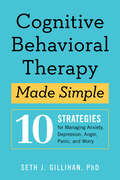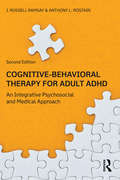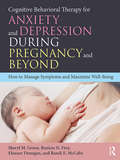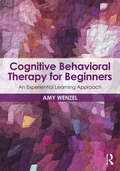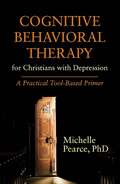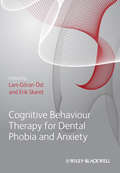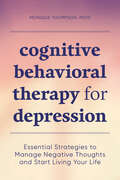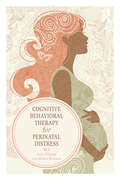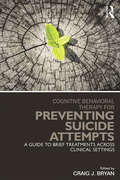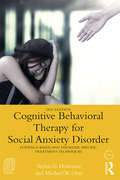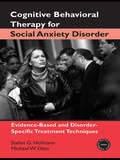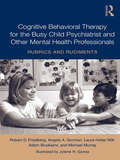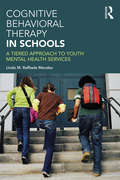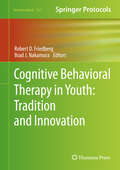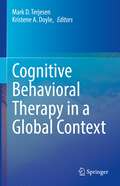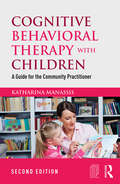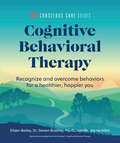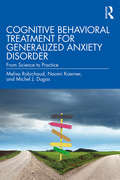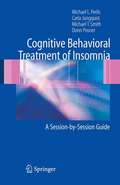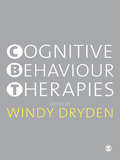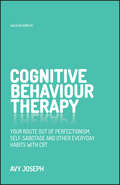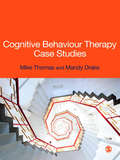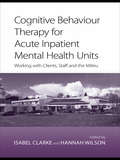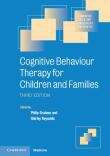- Table View
- List View
Cognitive Behavioral Therapy Made Simple: 10 Strategies for Managing Anxiety, Depression, Anger, Panic, and Worry (Retrain Your Brain with CBT)
by Seth J. Gillihan PhDCognitive behavior therapy strategies to help you manage anxiety and depression, whether you struggle with an anxiety disorder or are just feeling uneasy in life.Get lasting relief from anger, panic, stress, and other mood-related conditions by applying the principles of cognitive behavioral therapy to your daily life. From writing down your goals to addressing negative thought patterns, this accessible, easy-to-understand cognitive behavioral therapy book gives you everything you need to let the healing begin in one convenient CBT workbook. Soothe your mind, learn to grow as a person, overcome challenges, and boost your overall health and well-being.Explore cognitive behavior therapy in this workbook through:10 SOOTHING STRATEGIES: Discover proven CBT principles, like setting goals, maintaining mindfulness, and more.POSITIVE SELF-EVALUATIONS: Track your progress and reflect on what you've learned along the way.AN EXTRA TOOL FOR THERAPY: Use this workbook in tandem with clinical cognitive behavioral therapy or post-therapy.Progress toward healing with cognitive behavior therapy made simple.
Cognitive Behavioral Therapy for Adult ADHD: An Integrative Psychosocial and Medical Approach (Practical Clinical Guidebooks)
by J. Russell Ramsay Anthony L. RostainCognitive Behavioral Therapy for Adult ADHD: An Integrative Psychosocial and Medical Approach has been revised, updated, and expanded for this second edition and remains the definitive book for clinicians seeking to treat adults with ADHD. Clinicians will continue to benefit from the presentation of an evidence-supported treatment approach for adults with ADHD that combines cognitive behavioral therapy and pharmacotherapy adapted for this challenging clinical population. The updated edition of the book offers new and expanded case examples, and the authors emphasize more detailed, clinician-friendly "how to" instructions for the delivery of specific interventions for adult patients with ADHD. Understanding that most adults with ADHD say, "I know exactly what I need to do, but I just cannot make myself do it," the book pays special attention to the use of implementation strategies to help patients carry out the necessary coping skills to achieve improvements in functioning and well-being in their daily lives. In addition to providing an outline of their treatment approach, Drs. Ramsay and Rostain provide an up-to-date review of the current scientific understanding of the etiology, developmental course, and life outcomes of adults with ADHD as well as the components of an thorough diagnostic evaluation. As an added clinical resource, Drs. Ramsay and Rostain have also produced a companion patient handbook written for adults with ADHD, The Adult ADHD Tool Kit: Using CBT to Facilitate Coping Inside and Out, which clinicians can use with their patients.
Cognitive Behavioral Therapy for Anxiety and Depression During Pregnancy and Beyond: How to Manage Symptoms and Maximize Well-Being
by Randi E. McCabe Sheryl M. Green Benicio N. Frey Eleanor DoneganThis book is a hands-on guide for facilitating treatment of anxiety and depression during pregnancy and the postpartum period. Readers will learn about why anxiety and related difficulties can increase during pregnancy and the postpartum period, the critical roles that thoughts and behaviors play in maintaining symptoms, and how to apply practical cognitive and behavioral strategies to reduce distress and increase coping skills. Chapters are integrated with the latest research, and clinicians and individuals alike are presented with customizable cognitive behavioral therapy-based handouts, exercises, and worksheets proven to meet the unique needs of the perinatal population.
Cognitive Behavioral Therapy for Beginners: An Experiential Learning Approach (Clinical Topics in Psychology and Psychiatry)
by Amy WenzelCognitive Behavioral Therapy for Beginners lays out an experiential learning program replete with exercises to guide new clinicians, as well as more experienced therapists re-specializing in CBT, through the process of systematically implementing successful CBT interventions both for themselves and their clients. Each chapter examines a key construct in understandable terms, presenting an overarching view of how clinicians put these concepts and techniques into practice in typical as well as in difficult or unexpected scenarios. Readers will come away with a deep understanding not just of the standard principles of CBT but also of the real decisions and strategies that allow seasoned therapists to implement these principles in a way that maximizes the benefit to clients.
Cognitive Behavioral Therapy for Christians with Depression: A Practical Tool-Based Primer (Spirituality and Mental Health)
by Michelle PearceDoes religion belong in psychotherapy? For anyone in the helping profession, whether as mental health professional or religious leader, this question is bound to arise. Many mental health professionals feel uncomfortable discussing religion. In contrast, many religious leaders feel uncomfortable referring their congregants to professionals who do not know their faith or intent to engage with it. And yet Michelle Pearce, PhD, assistant professor and clinical psychologist at the Center for Integrative Medicine at the University of Maryland, argues that if religion is essential to a client, religion will be a part of psychotherapy, whether it is discussed or not. Clients cannot check their values at the door more than the professionals who treat them. <p><p>To Pearce, the question isn’t really, “does religion belong?” but rather, “how can mental health professionals help their religious clients engage with and use their faith as a healing resource in psychotherapy?” Cognitive Behavioral Therapy for Christian Clients with Depression is the answer to that question, as the book’s purpose is to educate mental health professionals and pastoral counselors about religion’s role in therapy, as well as equip them to discuss religious issues and use evidence-based, religiously-integrated tools with Christian clients experiencing depression.
Cognitive Behavioral Therapy for Dental Phobia and Anxiety
by Lars-Göran Öst Erik SkaretThe first book to describe evidence-based treatment of dental phobia using brief CBT, based on the pioneering single-session treatment for specific phobias developed by Lars-Göran Öst. Brings together research, experience and techniques from clinical psychology and dentistry to describe evidence-based treatment of dental phobia in clinical and dental contexts Chapters describe epidemiology, diagnosis and differential diagnosis, symptoms, clinical characteristics and consequences, and aetiology of dental phobia Also covers related issues including intra-oral injection phobia, dental treatment of fearful children, and the use of medication to supplement psychological treatment of fear
Cognitive Behavioral Therapy for Depression: Essential Strategies to Manage Negative Thoughts and Start Living Your Life
by Dr. Monique Thompson DHA, LPCBreak free from depression with these simple, effective CBT strategies Discover the help you need to manage negative thought patterns and reconnect with those around you. Cognitive Behavioral Therapy for Depression delivers an easy-to-use toolbox that provides you with straightforward and actionable exercises. Learn how to reexamine the way you think and act so you can start creating positive change in your daily life. Drawing on Dr. Monique Thompson's years of expertise using proven cognitive behavioral therapy techniques to help adults and teens face anxiety and depression, this compassionate guide teaches you essential skills and strategies from cognitive behavioral therapy to achieve lasting results. Cognitive Behavioral Therapy for Depression is: Depression based—Learn to manage your negative emotions and prevent experiential avoidance cycles by understanding the relationship between your thoughts, actions, and feelings. Beginner friendly—Find explanations and advice that are easy to follow for those who have no prior experience with cognitive behavioral therapy or similar therapies. Focused on practice—Teach yourself to stay engaged, connect with feelings, and more—all at your own pace—through simple and actionable exercises. Get help managing your depression with cognitive behavioral therapy.
Cognitive Behavioral Therapy for Eating Disorders: A Comprehensive Treatment Guide
by Glenn Waller Victoria Mountford Rachel Lawson Helen Cordery Hendrik Hinrichsen Emma Corstorphine Katie RussellThis book describes the application of cognitive behavioural principles to patients with a wide range of eating disorders - it covers those with straightforward problems and those with more complex conditions or co-morbid states. The book takes a highly pragmatic view. It is based on the published evidence, but stresses the importance of individualized, principle-based clinical work. It describes the techniques within the widest clinical context, for use across the age range and from referral to discharge. Throughout the text, the links between theory and practice are highlighted in order to stress the importance of the flexible application of skills to each new situation. Case studies and sample dialogs are employed to demonstrate the principles in action and the book concludes with a set of useful handouts for patients and other tools. This book will be essential reading for all those working with eating-disordered patients including psychologists, psychiatrists, nurses, counsellors, dieticians, and occupational therapists.
Cognitive Behavioral Therapy for Perinatal Distress
by Amy Wenzel Karen KleimanCountless studies have established the efficacy of cognitive behavioral therapy (CBT) for many manifestations of depression and anxiety. In Cognitive Behavioral Therapy for Perinatal Distress, Wenzel and Kleiman discuss the benefits of CBT for pregnant and postpartum women who suffer from emotional distress. The myths of CBT as rigid and intrusive are shattered as the authors describe its flexible application for perinatal women. This text teaches practitioners how to successfully integrate CBT structure and strategy into a supportive approach in working with this population. The examples used in the book will be familiar to postpartum specialists, making this an easily comprehensive and useful resource.
Cognitive Behavioral Therapy for Preventing Suicide Attempts: A Guide to Brief Treatments Across Clinical Settings (Clinical Topics in Psychology and Psychiatry)
by Craig J. BryanCognitive Behavioral Therapy for Preventing Suicide Attempts consolidates the accumulated knowledge and efforts of leading suicide researchers, and describes how a common, cognitive behavioral model of suicide has resulted in 50% or greater reductions in suicide attempts across clinical settings. Simple and straightforward descriptions of these techniques are provided, along with clear explanations of the interventions’ rationale and scientific support. Critically, specific adaptations of these interventions designed to meet the demands and needs of diverse settings and populations are explained. The result is a practical, clinician-friendly, how-to guide that demonstrates how to effectively reduce the risk for suicide attempts in any setting.
Cognitive Behavioral Therapy for Social Anxiety Disorder: Evidence-Based and Disorder Specific Treatment Techniques (Practical Clinical Guidebooks)
by Stefan G. Hofmann Michael W. OttoCognitive Behavioral Therapy (CBT) has proven to be the most effective form of treatment for social anxiety disorder. This revision of a highly regarded treatment manual presents an original treatment approach that includes specifically designed interventions to strengthen the relevant CBT strategies. This extensively revised volume builds upon empirical research to address the psychopathology and heterogeneity of social anxiety disorder, creating a series of specific interventions with numerous case examples and four new chapters on working with patients on medication, cultural factors, individual therapy, and monitoring on-track outcomes.
Cognitive Behavioral Therapy for Social Anxiety Disorder: Evidence-Based and Disorder-Specific Treatment Techniques (Practical Clinical Guidebooks)
by Stefan G. Hofmann Michael W. OttoSocial phobia, or social anxiety disorder, is among the most common (and debilitating) of the anxiety disorders, and at any given time it effects somewhere between 3 and 5% of the US population, with similar statistics found in countries around the world. Cognitive-Behavioral Therapy (CBT) has been demonstrated to be the most effective form of treatment for social phobia, but research has shown that conventional CBT principles and general interventions fall short of the mark. With this in mind, Hofmann and Otto have composed an organized treatment approach that includes specifically designed interventions to strengthen the relevant CBT strategies. This volume builds upon empirical research to address the psychopathology and heterogeneity of social phobia, creating a series of specific interventions with numerous case examples.
Cognitive Behavioral Therapy for the Busy Child Psychiatrist and Other Mental Health Professionals: Rubrics and Rudiments
by Michael Murray Robert D. Friedberg Angela A. Gorman Laura Hollar Wilt Adam BiuckiansCognitive Behavioral Therapy for the Busy Child Psychiatrist and Other Mental Health Professionals is an essential resource for clinical child psychologists, psychiatrists and psychotherapists, and mental health professionals. Since 2001, psychiatry residency programs have required resident competency in five specific psychotherapies, including cognitive-behavioral therapy. This unique text is a guidebook for instructors and outlines fundamental principles, while offering creative applications of technique to ensure that residency training programs are better equipped to train their staff.
Cognitive Behavioral Therapy in Schools: A Tiered Approach to Youth Mental Health Services
by Linda Raffaele MendezIn recent years, many U.S. schools have implemented tiered models of support to address a range of student needs, both academic and behavioral, while cognitive behavioral therapy (CBT) has simultaneously gained popularity as an effective means of supporting the mental health needs of students. Cognitive Behavioral Therapy in Schools provides school-based practitioners with the necessary skills to determine students' mental health needs; establish a tiered, CBT-based system of supports; select appropriate programs at Tiers 1, 2, and 3; deliver CBT using various formats to students who are at risk or demonstrating problems; progress monitor multiple tiers of service; and work collaboratively with teachers, administrators, and families.
Cognitive Behavioral Therapy in Youth: Tradition and Innovation (Neuromethods #156)
by Robert D. Friedberg Brad J. NakamuraThis volume discusses the proper applications of cognitive behavioral theory (CBT) to common clinical presentations. This book represents both the traditions and advances within the broad CBT field. Chapters in this book cover topics such as CBT with depressed youth; CBT for pediatric OCD; CBT with eating disordered youth; modular CBT for youth, and transdiagnostic treatment of emotional disorders in children and adolescents. In Neuromethods series style, chapters include the kind of detail and key advice from the specialists needed to get successful results in your laboratory.Cutting-edge and practical, Tradition and Innovation in Cognitive Behavioral Therapy in Youth is a valuable resource that inspires and encourages readers to use the practices discussed in this book as their own.
Cognitive Behavioral Therapy in a Global Context
by Kristene A. Doyle Mark D. TerjesenThis book presents a new approach to understanding the history and practice of cognitive-behavior therapy by presenting country profiles in 38 countries located around the world. The objectives of this edited volume are to provide a broad understanding of the practice of CBT internationally as well as country specific practices that will provide researchers and practitioners with important information for consideration in the application of CBT. The book begins with an introductory chapter by the editors that discusses the history of CBT and the efforts to globalize and disseminate the science and practice of CBT as well as the unique cultural and international variables. The subsequent chapters offer detailed country profiles of the history and practice of CBT from around the globe. More specifically, chapters will provide an overview of the country, a history of psychotherapy in the country, current regulations regarding psychotherapy provision, professional and cognitive behavior therapy organizations, training opportunities/programs in CBT, populations most frequently worked with using CBT in the country, the use and adaptation of CBT, the research on CBT in the country, and CBT with special populations (children, immigrants, HIV+, etc). Many of the nations represented are the most populous and influential ones in their respective regions where CBT has been incorporated into psychotherapy training and practice. Taken as a whole, the countries are quite diverse in terms of sociocultural, economic, and political conditions and the impact of these variables on the practice of CBT in the country will be discussed. The final chapter of the volume offers a summary of the patterns of practice, integrating the main findings and challenges and discussing them within a global context. A discussion of the vision for next steps in the globalization of CBT concludes the book.
Cognitive Behavioral Therapy with Children: A Guide for the Community Practitioner
by Katharina ManassisThis new edition of Cognitive Behavioral Therapy with Children links together the methods of cognitive behavioral therapy (CBT) practiced in academic centers as well as the community. This book addresses the challenges community practitioners face when pressured to use CBT with youth who live with mental health disorders, but whose circumstances differ from those in research settings. Practitioners will learn how to overcome therapeutic obstacles. This new edition contains an expanded discussion on cultural considerations relevant to assessment and treatment, as well as a new chapter on training others in CBT for children.
Cognitive Behavioral Therapy: Recognize and Overcome Behaviors for a Healthier, Happier You (Conscious Care Guides)
by Eileen Bailey Dr. Jayme Albin Steven BrodskyImprove your outcomes by adjusting your thinking and changing your behaviorDid you know you have the ability to change your thinking and control your actions from the inside out? Whether you suffer from an anxiety disorder or OCD, you struggle with diet or substance abuse, or you're simply unhappy with the results you're getting in life, congnitive behavioral therapy can teach you how to think and act more constructively. The pages in this book offer the tools you need to learn how to improve your outcomes in life simply by changing the ways in which you think. Discover powerful tools to identify and overcome self-defeating patterns, effective techniques for coping with anger issues, depression, and anxiety, helpful exercises for developing a realistic and positive attitude, and so much more!Keep the setbacks at bay, stay focused on your goals, and enjoy the results of your new outlook on life!
Cognitive Behavioral Treatment for Generalized Anxiety Disorder: From Science to Practice (Practical Clinical Guidebooks Ser.)
by Melisa Robichaud Naomi Koerner Michel J. DugasThe second edition of Cognitive Behavioral Treatment for Generalized Anxiety Disorder is an essential read for all clinicians, researchers, and anyone who wants to learn about how cognitive behavioral therapy (CBT) can be applied to treatment for generalized anxiety disorder. Building on the idea that intolerance of uncertainty keeps people with generalized anxiety disorder (GAD) stuck in repeated cycles of excessive worry, anxiety, and avoidance, this revised and updated edition lays out the essentials of GAD assessment and diagnosis, step-by-step illustrations of CBT treatment, and questionnaires and monitoring forms that can be used in assessment, treatment, and research. Readers will come away from the book with a clear sense of how to: design powerful, individualized behavioral experiments targeting the fear of uncertainty; help clients discover and re-evaluate their beliefs about the usefulness of worry; encourage clients to view worry-provoking problems as challenges to be met, rather than threats; use written exposure to help clients confront lingering worries and core fears.
Cognitive Behavioral Treatment of Insomnia: A Session-by-Session Guide
by Carla Jungquist Donn Posner Michael T. Smith Michael L. PerlisCognitive behavior therapy which has been adapted to treat so many problems, has also brought data-driven and data-yielding treatment to insomnia. Focusing on this evidence-based modality, Cognitive Behavioral Treatment of Insomnia is a much-needed treatment manual that provides clinicians with the why’s and how’s of this approach in concise and practical terms. This book, which is written as a reader-friendly guide, is intended for clinical trainees, non-insomnia sleep specialists, and for expert CBT clinicians from outside the sleep medicine field who wish to begin the process of learning to provide empirically validated CBT-I.
Cognitive Behaviour Therapies: 100 Key Points And Techniques (100 Key Points Ser.)
by Windy DrydenCBT has become more established as the therapy of choice for certain conditions in recent years, and consequently different voices in the CBT tradition have become prominent. This book brings together these voices by offering its readers a one-stop guide to the major approaches. Each chapter offers an overview of a particular approach to CBT, covering: - Historical development of the approach - Theoretical underpinnings - Practical Applications - Case Examples - Research status This book is essential reading for CBT trainees and practitioners as well as those training within the broader field of counselling and psychotherapy. Windy Dryden is Professor of Psychotherapeutic Studies and Programme Co-ordinator of the MSc in Rational-Emotive and Cognitive Behaviour Therapy at Goldsmiths, University of London.
Cognitive Behaviour Therapy
by Avy JosephFind out how to use CBT techniques in everyday life for emotionally healthy living What happens to you in life matters less than the way you feel about life; that's the message of Cognitive Behavior Therapy (CBT). If you've ever tried to change something about yourself--your mood, your weight, your behaviour--you'll have noticed that change often hurts, so you stop trying. CBT can help you when change starts to hurt. In the revised and updated edition of this bestselling title, professional CBT practitioner Avy Joseph shows you how to challenge negative thoughts and unhealthy beliefs to improve your outlook in your personal and professional life. Contains new scenarios and exercises for the reader to practice using CBT techniques in a variety of situations New introduction and conclusion from the author discussing the CBT technique and recent developments in the field Addresses key topics such as anxiety, change, resilience and self-belief Written by an expert in the field, Avy Joseph is widely-recognised as one of the UK's leading practitioners on the topic
Cognitive Behaviour Therapy Case Studies
by Mike Thomas Mandy DrakeThis book uniquely combines CBT with the Department of Health stepped care model to provide the first comprehensive case study-approach textbook. A step-by-step guide to using CBT, the book is structured around case studies of clients who present with the most commonly encountered conditions; from mild to more complex, enduring symptoms and diagnosis. This distinctive practical format is ideal in showing how to put the principles of CBT and stepped care into effect. As well as echoing postgraduate level training, it provides an insight into the experiences the trainee will encounter in real-world practice. Each chapter addresses a specific client condition and covers initial referral, presentation and assessment, case formulation, treatment interventions, evaluation of CBT strategies and discharge planning. Specific presenting problems covered include: - First onset and chronic Depression - Social Phobia - Obsessive-Compulsive Disorder - Generalised Anxiety Disorder (GAD) - Chronic Bulimia Nervosa and Anorexia nervosa - Alcohol Addiction - Personality Disorder The book also includes practical learning exercises for the reader and clinical hints, as well as extensive reference to further CBT research, resources and reading. This timely text will be invaluable for trainees on Improving Access to Psychological Therapies (IAPT) programmes, and anyone studying on postgraduate CBT courses.
Cognitive Behaviour Therapy for Acute Inpatient Mental Health Units: Working with Clients, Staff and the Milieu
by Isabel Clarke Hannah WilsonCognitive Behaviour Therapy for Acute Inpatient Mental Health Units presents innovative ways of delivering CBT within the inpatient setting and applying CBT principles to inform and enhance inpatient care. Maintaining staff morale and creating a culture of therapy in the acute inpatient unit is essential for a well-functioning institution. This book shows how this challenge can be addressed, along with introducing and evaluating an important advance in the practice of individual CBT for working with crisis, suited to inpatient work and crisis teams. The book covers a brief cross-diagnosis adaptation of CBT, employing arousal management and mindfulness, developed and evaluated by the editors. It features ways of supporting and developing the therapeutic role of inpatient staff through consultation and reflective practice. Chapters focus on topics such as: providing staff training working within psychiatric intensive care innovative psychological group work. Cognitive Behaviour Therapy for Acute Inpatient Mental Health Units will be essential reading for those trained, or those undergoing training in CBT as well as being of interest to a wider public of nurses, health care support workers, occupational therapists, medical staff and managers.
Cognitive Behaviour Therapy for Children and Families
by Philip Graham Shirley ReynoldsEntirely revised, rewritten and augmented with 11 completely new chapters, this new edition builds strongly on the aims of the previous edition to provide the latest scientific validation of cognitive behaviour therapy with practical treatment guidance for clinical child psychologists and psychiatrists working with disturbed children. Coverage ranges broadly from school refusal and adjustment to parental divorce through eating and sleeping disorders to substance abuse. It will be invaluable to clinicians wanting to provide ever more effective psychological treatment for children and families. From a review of the first edition: ' . . . clearly written by a number of international authorities in the field. . . . This book will be useful to child psychiatrists and other child mental health professionals, as well as social workers, educationalists and school nurses. It is highly recommended for bench and departmental libraries. ' European Child and Adolescent Psychiatry
